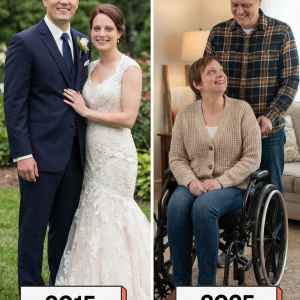The journey toward sobriety rarely follows a straight line—particularly when the person who needs help most refuses to believe they do. For one desperate father and his struggling son, the path to healing took an extraordinary detour that no one could have predicted: through an emergency dispatch line and into the hands of exactly the right person at exactly the right moment.
Picture this: a father behind the wheel, knuckles white with tension, driving toward what he hopes will be his son’s salvation. His son sits beside him, arms crossed, radiating anger and resistance. They’re headed to rehab, but only one of them wants to be going. The silence between them is suffocating, thick with everything left unsaid and all the pain they’ve carried for too long.
Then, in a moment of panic, the son grabs his father’s cell phone. His fingers shake as he punches in those three numbers. When the operator answers, he chokes out words that sound like a lifeline to him but a nightmare to his father: “Someone’s kidnapping me.”
Officer Mike Carpinelli responded to the call expecting a standard abduction scenario. What he found instead was something far more complex—a family fractured by addiction, a young man terrified of facing his demons, and a father who’d run out of options.
Another officer might have assessed the scene, confirmed there was no actual crime, and left them to sort it out. Carpinelli made a different choice. He saw past the false report to the real emergency underneath: a human being drowning in addiction, unable to see the hand reaching out to pull him to safety.
For more than an hour, Carpinelli sat with the young man and simply talked. Not lecturing, not threatening—just talking. He painted pictures with his words, telling stories of people he’d encountered who’d stood at this same crossroads. He stripped away the stigma and the fear, explaining what rehabilitation actually looks like: not a cage, but a bridge. Not an ending, but the first page of a new chapter. Not punishment for being sick, but treatment for a disease that had stolen too much already.
Something shifted. Maybe it was the officer’s tone—steady and judgment-free. Maybe it was hearing addiction called what it actually is: an illness, not a moral failing. Whatever the reason, the young man’s walls began to crack. He agreed to go to the treatment center, but he had one non-negotiable requirement: Officer Carpinelli had to be the one to take him there.
So the officer did exactly that. No police cruiser with flashing lights. No handcuffs or protocol. Just one man keeping a promise to another, driving together down a road that felt a little less terrifying when you weren’t traveling it alone. When they pulled up to the facility, Carpinelli didn’t simply point to the door and drive away. He walked the young man inside, staying until he felt steady enough to take the next step on his own.
That simple act of follow-through—of showing up fully when someone is at their most vulnerable—carried more weight than a thousand words ever could. Recovery specialists consistently emphasize that the foundation of healing is built on trust, and that afternoon, one officer’s willingness to truly see another person’s humanity created the connection that made everything else possible.
The story rippled outward from that quiet moment, spreading across social media and news outlets, igniting important conversations about substance abuse treatment, mental health care, and reimagining what public safety can look like when it’s rooted in compassion rather than force. For many, it became evidence that sometimes the most effective tools we have in combating the addiction crisis aren’t found in policy manuals—they’re found in our capacity for kindness.
What happened to the young man after he walked through those treatment center doors remains unknown. Recovery is private, and some stories don’t have neat endings we can wrap up and share. But this much is absolutely clear: that day fundamentally altered the trajectory of two lives. A father who’d been carrying the unbearable weight of helplessness watched a complete stranger hand his son something he couldn’t: the belief that recovery was worth fighting for. And a son who’d felt trapped and terrified discovered something he didn’t expect—the courage to stop running from himself.
This story cuts to the heart of something essential: addiction treatment programs and mental health resources save lives, but they can’t work until someone takes that first impossible step toward help. And sometimes, that step only happens because one person—a cop, a parent, a teacher, a friend—chooses empathy over judgment, patience over frustration, presence over convenience.
If addiction has touched your life or the life of someone you care about, hold onto this truth: seeking help isn’t a surrender to weakness. It’s the bravest choice you can make. And recovery doesn’t require perfection or hitting some imaginary bottom—it requires one person who believes you’re worth saving, and one moment when you start to believe it too.
Healing doesn’t begin in a treatment facility. It begins when someone sees you, really sees you, and refuses to look away.





